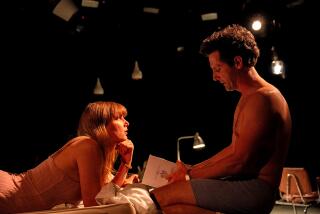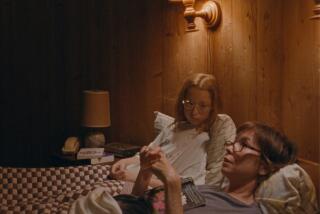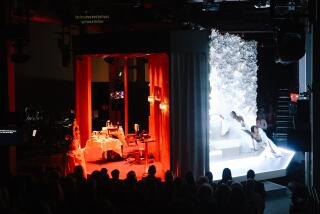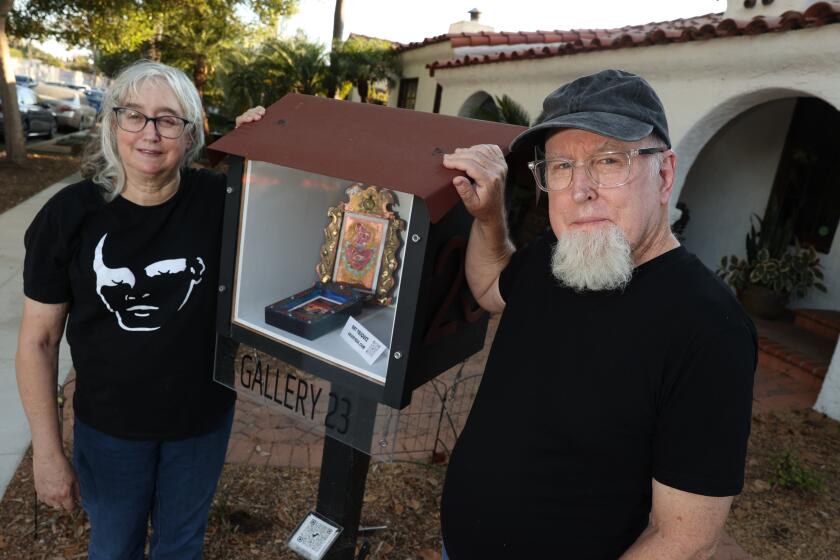Review: Toni Morrison’s ghostly ‘Desdemona’ blends words and music in lyrical revision of Shakespeare
From the merest suggestion in Shakespeare’s “Othello” that Desdemona may have had an African maid as a girl, Toni Morrison imagines hidden dimensions in the mind and heart of the Senator’s daughter who shocked Venice by marrying a Moor.
In “Desdemona,” which opened Thursday at UCLA’s Freud Playhouse and continues its run through Sunday, Morrison fills in the character’s story both before her meeting with Othello and after she is murdered by him. This isn’t so much a play as a theatrical séance, a meditation on the meaning of her life through modern considerations of gender and race scarcely thinkable in Shakespeare’s time.
SIGN UP for the free Essential Arts & Culture newsletter >>
Music holds equal weight with Morrison’s words. The incantatory singing of Malian singer-songwriter Rokia Traoré responds to the text in the spirit of contrapuntal jazz.
Themes derived from Shakespeare having to do with love, death and the natural world are lyrically extended in songs that are performed in Traoré’s native Bambara. (English supertitles are projected onto the stage, the words of the songs becoming part of the spare scenery.) Perched on a stool with her guitar, Traoré is accompanied by two female backup singers and two musicians playing ancient African instruments.
Discreetly occupying the shifting center of the production is Tina Benko, who plays Desdemona along with other characters from “Othello.” Benko’s beauty is porcelain-like, but there’s an athletic sturdiness to her that would seem hard to break. This Desdemona isn’t looking for revenge or apologies. She wants to understand what led to her tragic circumstances. More urgently, she wants to clarify that her actions, however shortsighted or blinded by privilege, emanated from love.
“I exist in between, now: between being killed and being un-dead; between life on Earth and life beyond it; between all time, which has no beginning and no end, and all space which is both a seedling as well as the sun it yearns for,” she says, establishing the otherworldly nature of the piece.
The production, hypnotically staged by Peter Sellars, resembles a holy ritual. Single light bulbs dangle midair, lending the effect of candles on the altar of a boutique hotel. Microphones are arrayed in sculptural configurations too abstract to be technologically imposing. Glass objects litter the floor, Laura’s menagerie recast with perfume bottles, jars and irregular lamps.
The company is outfitted in white, the women in dresses with straps, the men in suits. Purity, as vulnerable as ephemeral nature, is on parade. Perversion, evil and catastrophe lurk in the shadows.
Sellars is wise to treat “Desdemona” more as an artful concert album with literary riffs than a postmodern drama. Morrison’s writing is a crucial element of the production, establishing the world in which the music and scenography can vibrate in response. But the scenes aren’t ordered in a way that maximizes their effect. They are a quickly dissolving series, padding along in a ghost-like manner.
Benko, distinguishing male and female characters through vocal adjustments, enacts posthumous meetings between a poignantly soulful Desdemona and a surprisingly plaintive Othello and an accusatory Desdemona and a rather sharply defensive Emilia. A common thread is the plight of otherness, the desperation imposed by limited options. To know all isn’t to pardon all, but compassion widens with knowledge.
Morrison, a path-breaking novelist, follows an intuitive dramaturgy that can sometimes feel capricious. When the text dominates the other elements of the production, the theatrical effect is noticeably weakened. The music and staging lure us into a lovely dream state that the dialogue, which occasions the work but fails to drive it, can jar us out of.
Revisionist takes on characters have a pleasing audacity, but Morrison isn’t so much propounding a thesis as approaching a classic with a different level of political awareness. Cassio, whose presence is made known through the booming recording of a male voice, has become totalitarian after succeeding Othello as commander. The staging is disruptive in a way that feels heavy-handed, but the corrupting influence of power is exposed.
The most important confrontation is the one between Desdemona and her maid, Barbary (played in English by Traoré). This is the character glancingly referred to in Shakespeare’s tragedy as the heartbroken woman who taught Desdemona the “Willow” song that she sings prophetically before her death scene.
Desdemona, in Morrison’s update, reaches out to Barbary to explain that it was through their early contact that she was able to transcend the racial prejudices of her people and marry Othello. She wants to connect in friendship and love, but Barbary no longer has to hide inconvenient realities.
“I mean you don’t even know my name,” she tells her former mistress. “Barbary? Barbary is what you call Africa. Barbary is the geography of the foreigner, the savage. Barbary? Barbary equals the sly, vicious enemy who must be put down at any price; held down at any cost for the conquerors’ pleasure. ...”
These words speak irrefutable truths, but Desdemona reminds her former maid of their solidarity as women. A tender bond endures along with the pain.
Traoré’s poised humility and attentive stage presence lend great pathos to this production. The accumulated meaning of her aching lyrics and the magnificent vocal music she produces add to the melancholy beauty. So too does the need of Benko’s Desdemona to move beyond simple innocence and victimhood.
Follow me on Twitter @CharlesMcNulty
------------
‘Desdemona’
Where: UCLA Freud Playhouse, 405 Hilgard Ave., Westwood
When: 8 p.m. Saturday, 2 p.m. Sunday. Ends Sunday.
Tickets: $69-$89
Info: www.cap.ucla.edu, (310) 825-2101
Running time: 2 hours
More to Read
The biggest entertainment stories
Get our big stories about Hollywood, film, television, music, arts, culture and more right in your inbox as soon as they publish.
You may occasionally receive promotional content from the Los Angeles Times.











